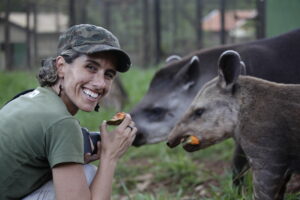On October 24th, WINGS WorldQuest will induct five new Fellows during our 2024 Women of Discovery Awards Gala in New York City. In a special Q&A series, we are sharing a little bit about each honoree. Dr. Patricia Medici is a Brazilian conservationist whose main professional interests are tapir conservation, tropical forest conservation, landscape ecology, and communication.

WINGS: Tell us your story. How did you get involved in science and your field specifically?
DR. PATRICIA MEDICI: I grew up in a small “finca” in the middle of the Atlantic Forest, on the way from Sao Paulo City to the coast of Sao Paulo State. The main activity for us kids in the neighborhood was to explore the forests, walk trails, swim in the rivers… And we had lots of animals around us including myriad of birds, monkeys and so much more. Therefore, nature was very much part of my life since I was little and becoming a conservation biologist was just a consequence!
WINGS: What is something you would like people to understand about your work?
DR. PATRICIA MEDICI: Tapir conservation is my life’s cause. Conservation is a lifestyle and requires passion, commitment, and dedication. It also requires the skills to work with people and get them involved.
WINGS: What are the greatest barriers to more women working in science?
DR. PATRICIA MEDICI: I strongly believe that the lack of mentorship and women leadership available to us at younger ages is an important barrier. When I was younger and starting my conservation career, it was almost impossible to find strong women role models.
WINGS: What gets you up in the morning?
DR. PATRICIA MEDICI: The first thing I do every morning is exercising… What gets me up in the morning is the need to get my body moving!
WINGS: What’s your next challenge?
DR. PATRICIA MEDICI: The establishment of our next tapir program, in the Caatinga. The Caatinga is a type of semi-arid tropical vegetation, and an ecoregion characterized by this vegetation in interior northeastern Brazil. The Caatinga is the only exclusively Brazilian biome, which means that a large part of its biological heritage cannot be found anywhere else on the planet. Tapirs were believed to be extinct in the Caatinga until our team carried out an expedition to the area in 2023 and found historic and recent records of the species.
WINGS: Describe yourself in three words.
DR. PATRICIA MEDICI: Tapirologist, conservationist, passionate.